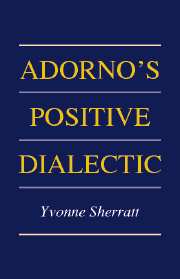Book contents
- Frontmatter
- Contents
- Preface
- Abbreviations
- Adorno's Positive Dialectic
- General Introduction
- PRELUDE TO ADORNO'S POSITIVE DIALECTIC
- Prelude I: Adorno's Intellectual Tradition: German Philosophy
- Prelude II: Adorno's Intellectual Tradition: Sigmund Freud
- ADORNO'S POSITIVE DIALECTIC: INTRODUCTION
- PART I NEGATIVE THESIS: THE DECLINE OF ENLIGHTENMENT
- 1 The Decline of Subjectivity: The Instincts
- 2 The Decline of Subjectivity: Narcissism
- 3 The Decline of Knowledge Acquisition
- 4 Knowledge Acquisition: A Negative Solution
- PART II POSITIVE THESIS: THE REDEMPTION OF ENLIGHTENMENT
- Bibliography
- Index
1 - The Decline of Subjectivity: The Instincts
Published online by Cambridge University Press: 10 August 2009
- Frontmatter
- Contents
- Preface
- Abbreviations
- Adorno's Positive Dialectic
- General Introduction
- PRELUDE TO ADORNO'S POSITIVE DIALECTIC
- Prelude I: Adorno's Intellectual Tradition: German Philosophy
- Prelude II: Adorno's Intellectual Tradition: Sigmund Freud
- ADORNO'S POSITIVE DIALECTIC: INTRODUCTION
- PART I NEGATIVE THESIS: THE DECLINE OF ENLIGHTENMENT
- 1 The Decline of Subjectivity: The Instincts
- 2 The Decline of Subjectivity: Narcissism
- 3 The Decline of Knowledge Acquisition
- 4 Knowledge Acquisition: A Negative Solution
- PART II POSITIVE THESIS: THE REDEMPTION OF ENLIGHTENMENT
- Bibliography
- Index
Summary
INTRODUCTION
In this chapter we show how Adorno regards enlightenment as regressing into myth. We do so through an examination of Adorno's use of Freud. We see how Adorno deploys Freud to make a critique of the instinctual basis of enlightenment Subjectivity.
First we depict the relevant aspects of Freud's work on the instincts. Secondly, we show how Adorno uses Freud. We do this by following his narrative of the decline of enlightenment which we depict through four clear stages.
ADORNO ON FREUD
Adorno utilises Freud's ideas in order to interpret the enlightenment. Although deploying Freud, we have noted in our Prelude, that Adorno's relationship with Freud's work is complex; he both approriates and criticises. We should note that in fact, the complexity of this relationship derives in no small measure from Adorno's view that Freud is deeply connected to enlightenment. There are two dimensions to Adorno's view of Freud in this regard.
First, Adorno considers that Freud most clearly represents the ideas of the enlightenment. That is to say, Freud is an instance of the general phenomenon of enlightenment which means that Adorno regards him as both inherently positive, in the sense of being in league with the enlightenment's aims, and inherently negative: he is part and parcel of the failure of the enlightenment.
Second, Adorno's ambivalence towards Freud has a further peculiarity. Not only is Freud intrinsically part of enlightenment culture but, in Adorno's view, Freud provides a conceptual framework through which to view enlightenment critically.
- Type
- Chapter
- Information
- Adorno's Positive Dialectic , pp. 75 - 96Publisher: Cambridge University PressPrint publication year: 2002



